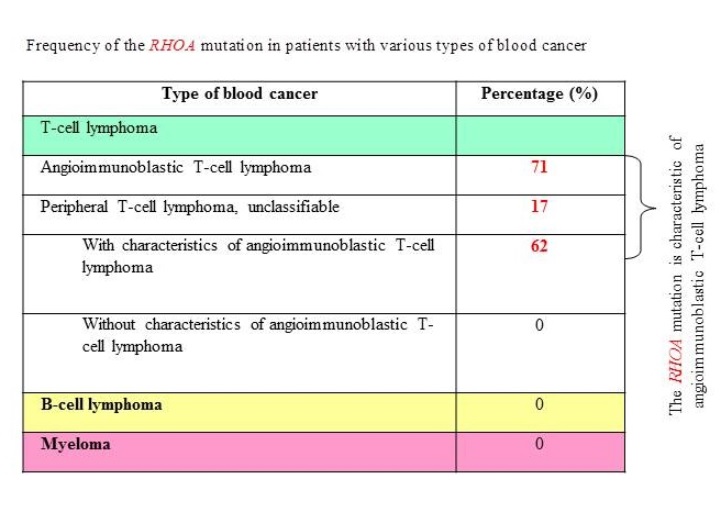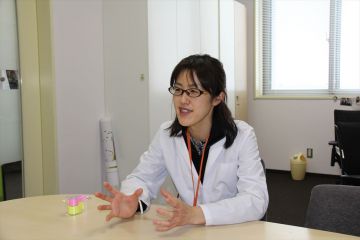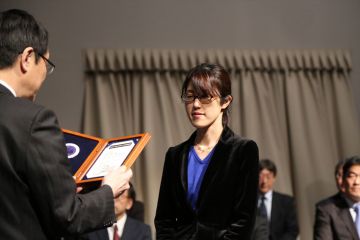TSUKUBA FUTURE
#038 Working Toward Molecularly Targeted Therapies for Blood Cancers
Associate Professor SAKATA Mamiko, Faculty of Medicine

Prof. Sakata's research is focused on malignant lymphoma. It is a disease in which lymphocytes that flow through the bloodstream become cancerous. Lymph node swelling is a common symptom in the early stage, with fever, weight loss, and night sweats appearing as the disease progresses. Malignant lymphoma is a more common blood cancer than leukemia and has over several dozen known subtypes, each with a different pathology and different treatments. Although chemotherapy with anticancer drugs is the primary treatment for malignant lymphoma, researchers have begun attempting to develop treatments targeting causative gene mutations, the understanding of which has been progressing in recent years.

Prof. Sakata's research team is researching a type of malignant lymphoma called "T-cell lymphoma." They examined all of the genes (i.e., the genome) of a large number of patients using DNA samples Through this, they found that roughly 70% of patients with angioimmunoblastic T-cell lymphoma, a kind of T-cell lymphoma common in elderly adults, had a mutation in a specific gene called RHOA. This gene codes a protein that turns an important signal on and off and it seems toplay an important role in life activity of living body.
Another noteworthy aspect of this discovery by Prof. Sakata and her team is that this is the first time this RHOA mutation has been detected in any of the numerous types of blood cancers. This essentially means that it is a gene mutation characteristic of angioimmunoblastic T-cell lymphoma. A test called histopathological examination that involves observation of a segment of a lymphoma under a microscope has conventionally been the primary method of diagnosing malignant lymphomas such as angioimmunoblastic T-cell lymphoma. However, diagnosis of malignant lymphoma is frequently difficult with such conventional methods alone. The discovery of this specific characteristic of angioimmunoblastic T-cell lymphoma by Prof. Sakata and her team will hopefully enable doctors to make accurate diagnoses by testing for the presence of the RHOA mutation. More intricate analysis in the laboratory is still necessary at this point, but Prof. Sakata and her team are presently working on research and development projects that will enable use of this gene mutation in actual diagnosis. Additionally, if a drug specifically targeting the abnormal protein created by the RHOA mutation (i.e., a molecularly targeted drug) were developed, it could be used to treat this malignant tumor. Prof. Sakata and her team are also working to develop such a drug.

Prof. Sakata says that she hopes to extensively utilize the research environment at University of Tsukuba Hospital in her clinical work and research.
Prof. Sakata and her colleagues in the Department of Hematology at the University of Tsukuba are energetically conducting research projects on blood cancer and mechanisms of blood production in addition to performing outpatient and inpatient care. It takes a lot of work to conduct experimental research on the original cause of a disease, its diagnosis, and new treatment methods while treating patients with the disease at the same time. Nevertheless, University of Tsukuba Hospital actively encourages its doctors to be "physician scientists" who fulfill both of these roles. There are several benefits of a physician also conducting research. On the research side, it is easy for them to determine what aspects they should focus on because they understand the disease, and moreover, it is easy for them to obtain samples for research through their clinical network. On the clinical side, it is easy for them to apply new knowledge they have obtained through research to patient care.
Whereas cancer in the white blood cells or lymphocytes is called "blood cancer," cancers in the organs, for example, gastric cancer or lung cancer, are called "solid cancers." It is easier for researchers to determine the process of onset of blood cancers than that of solid cancers. Therefore, it may be possible to apply collected findings about blood cancers to the treatment of solid cancers. This is one reason why Prof. Sakata, who aspired to conduct cancer research, chose hematology as her specialty field. The University of Tsukuba is blessed with an excellent research environment due to its participation in a program enabling shared use of cutting-edge analytical devices. Prof. Sakata hopes to develop methods for early diagnosis of fast-progressing malignant cancers as quickly as possible.

Prof. Sakata was awarded a Best Faculty Member Award for the 2014 academic year.
Article by Science Communicator at the Office of Public Relations


